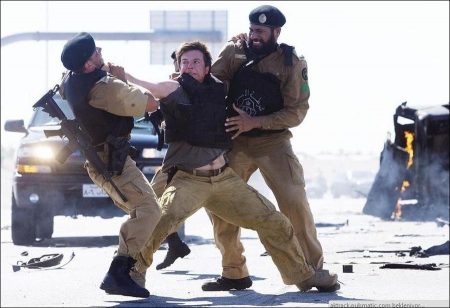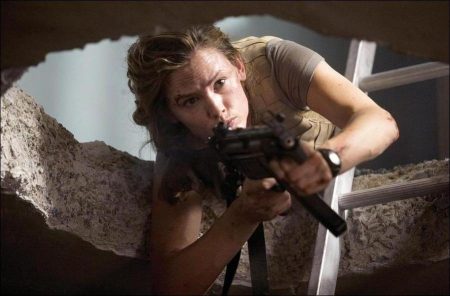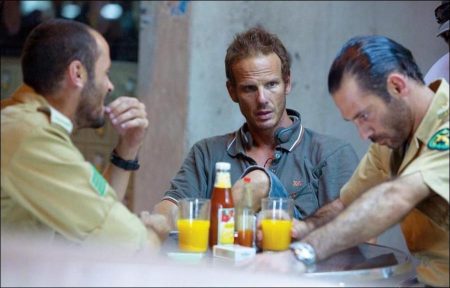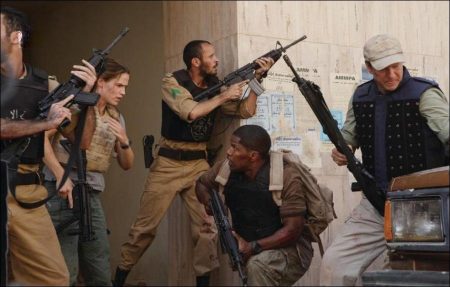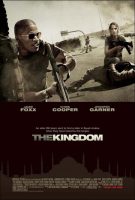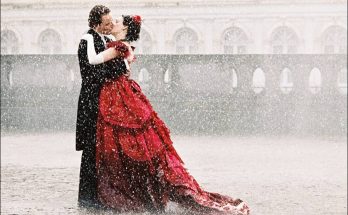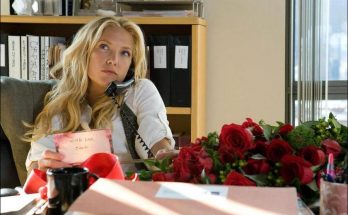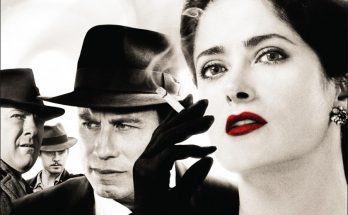Tagline: Under fire. Under pressure. Out of time.
Director Peter Berg, who blisteringly reinterpreted the high-school sports drama with the celebrated “Friday Night Lights,” producer Michael Mann, who has defined the high-tension crime genre for more than a decade, (“Heat,” “Collateral,” “Miami Vice”) and producer Scott Stuber (“You, Me and Dupree,” “The Break-Up”) join Oscar winner Jamie Foxx in a timely thriller about the explosive clash that happens when Middle East meets West: “The Kingdom.”
Foxx stars as whip-smart FBI Special Agent Ronald Fleury, who has just received the assignment of his career: assemble an elite team (played by Jennifer Garner, Oscar winner Chris Cooper and Jason Bateman) to hunt down and capture the terrorist mastermind responsible for a deadly attack on Americans working in Saudi Arabia. The feds have only one week to infiltrate and cripple a cell bent on jihad to western society.
No training could prepare Fleury and his team for the disorienting culture shock they face once inside this scorching foreign land, byzantine maze of politicians, storefront terrorists and double-crossing businessmen who traffic in profiteering and exploit any opportunity to grow ever richer, no matter the human cost.
Bound by handlers who refuse to play ball with the U.S., the agents quickly find the local law enforcement more hindrance than help and soon grow uncertain of anybody’s allegiance. But when a sympathetic Saudi police captain helps them navigate Riyadh politics and investigate the true cause of the attack, Fleury finds an unexpected comrade-in-arms. In their lightning fast attempt to crack the case, the partners search leads them straight to the killer’s front door. Now in a fight for their own lives, two teams on opposite sides of the war on terror won’t stop until vengeance is found in “The Kindgom.”
Welcome to The Kingdom
Peter Berg conceived of the idea for The Kingdom a decade ago, after watching news coverage of the infamous June 25, 1996, Khobar Towers terrorist attack in Khobar, Saudi Arabia. Saudi Hezbollah exploded a fuel truck that slaughtered 19 Americans, a Saudi national and wounded 372 people of many nationalities in one of the most brutal anti-American attacks ever staged in that region.
Berg recalls of the attack that affected U.S. relations with its Saudi allies: “It was an act of terrorism that targeted Americans, and was felt painfully by Saudis as well. It led to the FBI trying to work for the first time with Saudi law enforcement, which proved to be a complicated and tricky investigative effort. I thought it would be a fascinating idea for a film, to watch how the American and Arab cultures—both targets of religious violence and sharing a common interest in battling religious extremism—navigate differences, suspicions and politics to try and work together.”
Over the next few years, the idea would gestate as Berg developed a dual career as actor and filmmaker, helming notable box-office hits from The Rundown to Friday Night Lights. The concept would also gel in the scores of conversations he and a close Saudi friend had about the political realities and complexities of Arab-American relations. And then came September 11, 2001.
“After 9/11, there was so much anti-Saudi sentiment in the States, because so many of the hijackers were from Saudi Arabia; Osama was Saudi. But, it wasn’t reflected in my relationships with Saudis I knew.” The director believed that there was no better time to make a film that “looks at the joint Arab and American fight against violent extremism.”
He wanted to create an action-thriller that presented two worlds working together, “through the friendship that develops between two men from very different cultures—an FBI agent and a Saudi colonel.” And he would find that material during Summer 2003.
In June 2003, Berg approached Mann in his office next door and asked if he’d produce the project through his Forward Pass production company. Mann was producing The Aviator, directed by Martin Scorsese, and liked the idea of working with strong directors with authoritative visions. The screenwriter Berg had in mind was a 30-yearold unknown named Matthew Michael Carnahan, who had written a scorching drama titled Soldier Field—which told the story of a Chicago police officer pitted against the Mafia and the Russian mob. Mann had read Carnahan’s Soldier Field.
Berg responded to the strategic ways in which Carnahan crafted action, and knew he was the man for the job. “He’s a politically savvy guy, but he also writes kick-ass action,” the director says. “We didn’t want to make a film that fundamentally existed as a political exposé. We wanted a film that was entertaining and muscular with strong action, yet was fair in capturing the politics of the times.” Mann and Berg took the story to Universal Pictures.
Mann, long known for his catalogue of explosive thrillers and smart dramas, was curious to explore a “procedural homicide investigation done in the most hostile of circumstances.” He thought there would be great dramatic tension in the knowledge that, for ops-leader Ronald Fleury, “they don’t want you there; your government doesn’t want you to be there. And all of that forces a collision, and eventually, a fraternal loyalty between two law enforcement officials.”
The celebrated filmmaker believed there was no better way to examine political, global and regional issues than by examining them through the experience of a homicide detective. He offers, “When violence happens, it is truly traumatic on the personal level. That’s why we wanted to ground this whole story inside the day-to-day experience of two exceptionally skilled police types who are also average guys with concerns for their families and the state of safety in their countries.”
Producer Scott Stuber, who previously worked with director Berg on both The Rundown and Friday Night Lights as Universal Pictures’ vice chairman of worldwide production, remembers when the idea for the project came across his desk. “Pete, Michael and I had dinner together,” he recalls. “They pitched the story to me, and I thought it was a great idea. We were all big fans of Carnahan’s script for Soldier Field, and he wanted to write this…so it was an easy pitch for me to buy for the studio.”
During the project’s development, Stuber announced his departure from the executive suites of Universal to form, along with his co-chair at the studio and one of the film’s executive producers, Mary Parent, the production company Stuber/Parent. Berg and Mann contacted Stuber, asking him to stay on and help shepherd the project to the screen. The Kingdom was one of the projects that Stuber had passionately advocated at Universal, and he was committed to helping fulfill the project’s destiny by working on it as a producer.
Stuber responded to the developing story of taking “four investigators and putting them on Mars—in a place that’s the most difficult to execute their job.” He firmly believed The Kingdom could “play both as an intellectual drama and as an action movie—it has action and thrills, but it also deals with real-world problems.”
Mann introduced the team to Richard Klein, managing director for the Middle East and Arabian Gulf at Kissinger McLarty Associates, and Time magazine’s Elaine Shannon. And on multiple research trips to Washington, D.C., Carnahan met with several of the FBI’s top explosives experts and hostage rescue team members to get specifics of their experiences in the Middle East. He spoke with agents who had seen the after effects of the Khobar bombings, worked in Yemen after the U.S.S. Cole was attacked and slogged through East Africa after American embassies were bombed.
Carnahan leveraged their encyclopedic knowledge and perceptions of working with foreign nationals into making the script as true to life as possible. He was particularly intrigued by the stories of hostage rescue team members accompanying the FBI and protecting investigators—and the different standards of justice, criminal procedure and criminal science they found in their host countries. Tragically, in May 2003, three western housing complexes in Saudi Arabia were attacked in the same night.
That was the final seed that would inform the filmed script. Berg was able to travel to Saudi Arabia to do additional research on behalf of the film. In one scouting session, he sat on a panel with Saudi women and men from different strata of society. “This is a story set in a world that most of us know nothing about, but Pete had a real vision for the type of movie he wanted to make,” recalls Stuber.
The director emphasizes he wasn’t “looking to make a jingoistic all-American film about a group of Americans that come and kick ass in an Arab culture. We’re politically neutral in the film. If we go after anyone, it’s violent extremism. This movie is about Americans and Arabs working together in a very decent and human way.”
Production green lit and a script finished, the producers and Berg would look to develop an elite team out of four American and two Arab actors who were willing to undergo hard-core training in the most brutal of heat.
Agents and Terrorists: Cast is Chosen
The filmmakers knew when they were searching for an action star to play the head of an elite FBI task force, they should turn to Oscar winner Jamie Foxx. Mann handed the screenplay to Foxx on the set of Miami Vice. The actor responded to Fleury’s pain at losing an old friend in the bombing…and his desire for revenge.
Notes Foxx, “Fleury has to deal with the fact that his views on the war on terror change completely when someone he and his family love and admire loses his life. Death has been brought to his doorstep, and he must decide how to deal with it.”
Producer Mann commends, “Jamie can project himself so thoroughly into characters and identities. He’s absolutely credible to me as somebody in the FBI—there is a seriousness of intent that these folks have.”
Producer Stuber was in agreement. During his time at Universal, Stuber oversaw several projects in which Foxx would star. From Ray to Jarhead and Miami Vice, the filmmaker had worked with Foxx and pursued him for the starring role in The Kingdom.
Academy Award winner Chris Cooper, who plays the veteran among the quartet of agents dispatched to Riyadh, was interested in The Kingdom because he saw the film as both a political action thriller and a “heartfelt, serious piece that was truly informative about our relationship with Saudi Arabia. If I can find a project that’s as informative and as immediate as this, that’s something I like to spend my energies doing.”
Berg and Carnahan had developed the character of Grant Sykes as an explosives expert who, according to Berg, “is obsessed with bombs and the science of reverse engineering.” Not only would Cooper bring that visible intellect to the screen, he would also serve as the team’s ad hoc father figure.
For the evidence response team’s sole female role, Berg chose an old friend: Jennifer Garner, the Golden Globe winner who took four consecutive Emmy nominations for her starring turn on the ABC thriller Alias (a show on which Berg played the recurring character of SD-6 Agent Noah Hicks during the series’ debut season).
Garner found the script to be “compelling, visceral and terrifying,” and was quickly drawn into the world of Special Agent Janet Mayes, the team’s linguistics and forensics expert. Of Mayes, Garner explains: “One of her best friends from Quantico, Fran Manners (played by KYLE CHANDLER), is killed in this explosion in Saudi Arabia. When she and her colleagues are initially told that they cannot go and investigate Fran’s death and find who is behind it, it makes her crazy.”
Jason Bateman, who co-starred opposite director Berg in the recent black comedy Smokin’ Aces, takes a different turn with his role of FBI Special Agent Adam Leavitt. There is, however, an element of Bateman’s welcome wisecracking to the intelligence analyst who Carnahan based on a D.C. friend. The layers of the script impressed Bateman, who comments, “The political theme is up to each individual’s interpretation. To me, it speaks to how futile this eye-for-an-eye revenge gets. The film is filled with jeopardy and political intrigue, done in a very entertaining, action-packed, scary way.”
Of the types of federal officers who inspired this film, Mann notes: “They put up with the politicized parts of their bureaucracies to do that job. But they’re intelligent, dedicated people—and that’s what’s on screen. Jen Garner, Jason Bateman and Chris Cooper? They’ve just got it down.”
Another key element to Carnahan’s story was the involvement of two Saudi players who help the visiting FBI: Sergeant Haytham, the police officer who witnesses the carnage firsthand while on duty at the housing compound, and Colonel Al Ghazi, the man brought in to keep an eye on the Americans while they investigate the crime.
Comments producer Stuber: “One of the most appealing things is that we have two Saudi Arabian characters who allow the audience to understand how they behave and interact in their culture. It’s great insight into this world and this region.”
For the roles, Berg, Mann and Stuber would look toward two Middle Eastern actors who starred in an Oscar-nominated thriller about Palestinian terrorists in Israel: Ali Suliman and Ashraf Barhom. “After screening Paradise Now,” recalls Stuber. “We were immediately drawn to Ali and Ashraf, and said those were the guys we had to get; they were so charismatic and interesting.” The filmmakers signed Suliman first, then selected Barhom after Berg met with the actor in Hong Kong.
Berg knew one of the crucial arcs to Carnahan’s script lay in the development of the character of Colonel Al Ghazi, to be played by Barhom. During their time on the case, Barhom and SA Fleury discover unanticipated similarities with one another; they are both fathers of young children who just want to protect their families and maintain the peace for their countries. The director felt their growing respect for one another represented something very underrepresented in mainstream media: an awareness that moderate people in every culture crave simple law and order for their communities.
Barhom was drawn to his character because of his “strong personality, honesty and directness. He is loyal and goes for his goals, until he reaches what he wants. I wanted to be involved because the attitude of this script was one of bringing harmony and putting the focus on something very important.”
In addition to bringing authenticity to the set, Saudi citizen Ahmed Al-Ibrahim served as a cultural expert and worked with the cast on dialogue and dialects. His duties included collaborating with Barhom and Suliman to learn the Saudi dialect different from their own.
Leads set, the production aimed to populate the action-thriller’s background with native Arabs and Middle Easterners. More than 3,000 Americans of Persian, Turkish or Saudi descent (as well as an additional range of ethnicities) were found on location and hired to play Saudi police, soldiers, townsfolk or insurgents. All were dressed in authentic garbs shipped from Arabic regions in Saudi Arabia, Dubai and Abu Dhabi. Casting set, the production would begin training its police officers, federal agents and terrorist insurgents for analysis and war.
Middle East Meets West: Locations and Sets of the Film
The Kingdom began principal photography on location in the Phoenix area. In addition to the Sun Valley, key domestic locations for the project included Mesa and Gilbert, Arizona—where the film’s main sets were built at Arizona State University’s Polytechnic Campus—and Washington, D.C., at the World War II Memorial and the Department of Justice building.
“We had to find a desert locale in the U.S. that could simulate Saudi Arabia,” producer Stuber notes. “Your options are really the Southwest, be it in Arizona or the California desert. The topography around Phoenix gave us the vistas and depth we needed to accurately recreate Saudi Arabia in the U.S.—the same look and texture.”
Just add plenty of scorching weather that forced 4:00 a.m. call times throughout the course of the 10-week stay in Arizona. “The heat was tough,” Stuber admits. “We were outdoors on a lot in the middle of the desert, with 110-, 115-degree temperatures that were taxing. Everyone had a common enemy in the heat.”
In designing his Riyadh set, production designer Tom Duffield notes, “The Arab buildings in this movie were based on sites in Abu Dhabi in the United Arab Emirates (U.A.E.). I went there in prep and photographed a lot of houses and buildings. The target house and Suweidi street sets were based on photos from the U.A.E.”
The crew needed an old military housing compound to set the American oilcompany housing development in Riyadh where the bomb blast occurs. Suburban Phoenix’s Williams Air Force Base, a decommissioned military compound adjacent to Williams Gateway Airfield in Mesa, was the perfect space. The area, now serving as part of ASU’s Polytechnic’s East Campus, had a layout that would prove ideal for the desert look of the Gulf Oasis Western Housing Compound.
On the ASU campus, the art department and construction crews leveled an old dirt road and built three four-story condo facades and a working baseball field—for both the film’s opening sequences prior to the attack and the decimated aftermath.
After Berg filmed the huge explosion, Duffield’s crew spent the next 10 days stripping down the set to create the bombed-out facade, littered with dozens of torched auto carcasses strewn across the baseball diamond and parking lot—courtesy of special effects coordinator Burt Dalton’s mechanical effects crew. His team actually blew up 40 cars in the desert to dress the remarkable set.
The painstakingly detailed set took the construction crew almost three months to build and dress for the cameras, in scorching heat that, on many days, forced laborers to abandon their posts as early as 2:00 p.m.
Instead of building two separate sets (pre- and post-explosion), Duffield describes how they economized the look. “We stripped the facades off—built the pre-explosion facade over the post-explosion front. The material looks like concrete block, but it’s actually foam cast made to look like concrete block. Our set decorator, Ron Reiss, went out and got all the debris to scatter around this six-acre set.”
On an adjacent part of the ASU campus, the production design team also constructed a network of suburban streets (accurately doubling the Suweidi section of Riyadh) where the FBI agents and Saudi police engage in a fierce gunfight with the terrorist cell. In an industrial park warehouse in the nearby suburb of Chandler, Duffield’s art department designed the interiors of an apartment where the terrorist mastermind takes refuge, and where one of the FBI agents is kidnapped and tortured.
As needed, the art department dressed the surrounding freeway near ASU with Arabic-language signs, replacing the normal speed limit and exit signage scattered throughout the two-mile route. Of course, (almost) all signs were removed prior to the Monday morning commute so local airfreight drivers didn’t get confused during deliveries.
As key pieces of the film are set in Washington, D.C., the company would next move on to the American capital city for two days of detailed exterior filming of the WWII Memorial and the J. Edgar Hoover Building. Their next stop would be the Middle East itself.
When selecting foreign locales for the project, the filmmakers faced a predicament to achieve authenticity: Can you and should you film on location in the script’s key regions of the Middle East? Not only does the Kingdom of Saudi Arabia have strict regulations on business and tourism, the Department of State continues to warn U.S. citizens to defer nonessential travel to the Kingdom; therefore, that option was quickly squelched.
To add authenticity to the film, however, the production would need to turn to a D.C.-based international advisory and strategic consulting firm that had assisted producer Mann on his Caribbean and South American location shoots for Miami Vice. Upon consideration of multiple Middle Eastern locales, Abu Dhabi, the capital city of the seven United Arab Emirates—situated on the Arabian Gulf east of Saudi Arabia and southwest of Iran—proved to be an attractive option. The only catch? The city had never hosted a large film production from the West.
Consultant Richard Klein secured meetings for the filmmakers with top officials in the U.A.E. government and military. They were eager to welcome the production to their country and demonstrate the thriving economy and tolerance of the Emirate of Abu Dhabi and the U.A.E. As the team scouted locations, they found they could stage pivotal scenes from Carnahan’s story at the Emirates Palace Hotel and the tough working-class area of Mussafah, both doubling for The Kingdom’s locations in Riyadh. Too, there were many architectural similarities to be found throughout the city.
In anticipation of the eight-day photography in Abu Dhabi, Klein issued a 17- page memo to all cast and crew, prior to their traveling. The document covered everything from protocol to security to sensitivity issues, such as signs of disrespect (including use of one’s left hand or showing the bottom of one’s shoes or feet) and the production members’ need to dress modestly to respect local tradition and cultures.
“It was important for us to be able to go to the Middle East,” Berg emphasizes. “The film is about cooperation between American and Middle Eastern law enforcement, and we thought that it was really important to come and to experience their culture—not necessarily that it would be the easiest location to film in. It was hot in Arizona, but it was hotter there. Still, these are locations that we couldn’t replicate in the States.”
He laughs, “It was a marathon. We moved from L.A. to Arizona, re-creating giant chunks of Saudi Arabia in Arizona. Then, we picked up and took an American and English film crew thousands of miles to the Middle East—to a city that has never hosted a film before. All of that worked to guarantee us a real unique adventure.”
Stuber agrees with the assessment. “Authenticity has always been vital to the film,” the producer comments. “The audience has to believe and understand the clash of cultures making the location itself a character. Once we saw Abu Dhabi, we immediately knew we had to shoot there to capture the level of specificity required.”
Abu Dhabi’s leaders, decision-makers and government worked with the production to secure access to the magnificent interiors of the Emirates Palace Hotel, a luxurious resort on the Arabian Gulf that doubled as the fictional Saudi palace of Prince Ahmed bin Khaled in The Kingdom. The hotel was originally constructed to host the Gulf Cooperation Council, an organization of the six Gulf countries (Saudi Arabia, Bahrain, Kuwait, Oman, Qatar and the U.A.E.) that meets annually. With 1,000 Swarovski crystal chandeliers, gleaming marbled corridors, gold-leaf walls and suites with individual lifts, one cannot imagine the opulence of the $3 billion-plus, 247-acre hotel property.
The hotel not only had a role in the film, but also housed the cast and crew during their visit to the Middle East. The production shot for two days inside the grand suites, and six exterior days—one in downtown Abu Dhabi, the others in the suburb of Mussafah, about a half-hour west of the city.
Production wrapped, the actors playing both the core FBI team and Saudi brethren could reflect on what they had accomplished in The Kingdom. Ashraf Barhom best summarizes the thoughts and feelings of the group: “What was important is to give light to these issues, to try and go to the black sides of our world and take some things from there and put them in the spotlight. I believe this movie will carry on in this way and bring more people to begin the conversation about dangerous issues.”
Producer Mann agrees with the actor’s assessment and filmgoers appetite for this type of action-thriller: “There is a hunger for American audiences on an intellectual level and a purely visceral level to embrace this material; their interest is a testament to the way American audiences really are.”
Producer Stuber notes, “The Kingdom has been a long road for all of us. Our hope is that audiences are moved by the film and they embrace it—as not only entertaining, but emotional and thought provoking.”
Director Berg concludes of the film he began making 10 years ago and the one he has finished today: “It’s about connecting on a human level, battling violence and trying to bring those responsible for killing truly innocent people to justice. It’s done without any political or religious agenda, but out of the spirit of friendship and humanity.”
The Kingdom (2007)
Directed by: Peter Berg
Starring: Jamie Foxx, Jennifer Garner, Chris Cooper, Jason Bateman, Jeremy Piven, Ashraf Barhom, Ali Sulliman, Kyle Chandler, Frances Fisher, Anna Deavere Smith, Minka Kelly
Screenplay by: Matthew Michael Carnahan
Production Design by: Tom Duffield
Cinematography by: Mauro Fiore
Film Editing by: Colby Parker Jr., Kevin Stitt
Costume Design by: Susan Matheson
Set Decoration by: Ronald R. Reiss
Art Direction by: A. Todd Holland, Patrick M. Sullivan Jr.
Music by: Danny Elfman
MPAA Rating: R for intense sequences of graphic brutal violence, and language.
Distributed by: Universal Pictures
Release Date: September 28, 2007
Visits: 61
